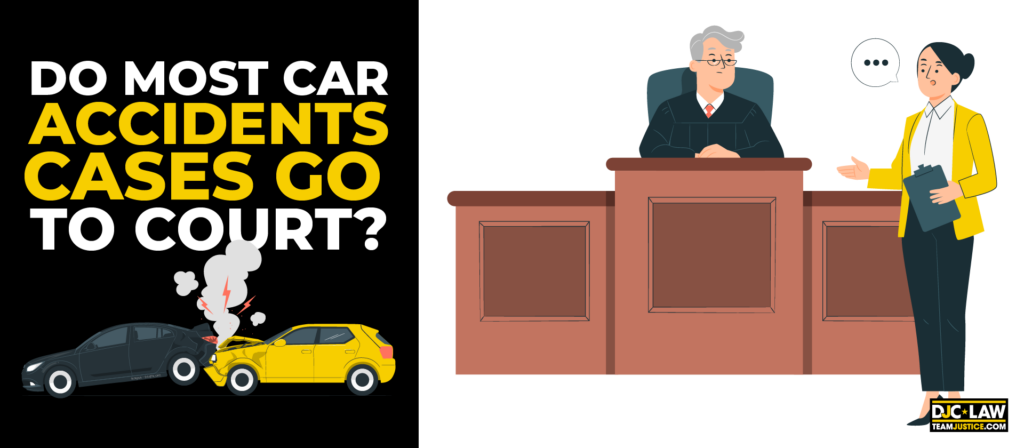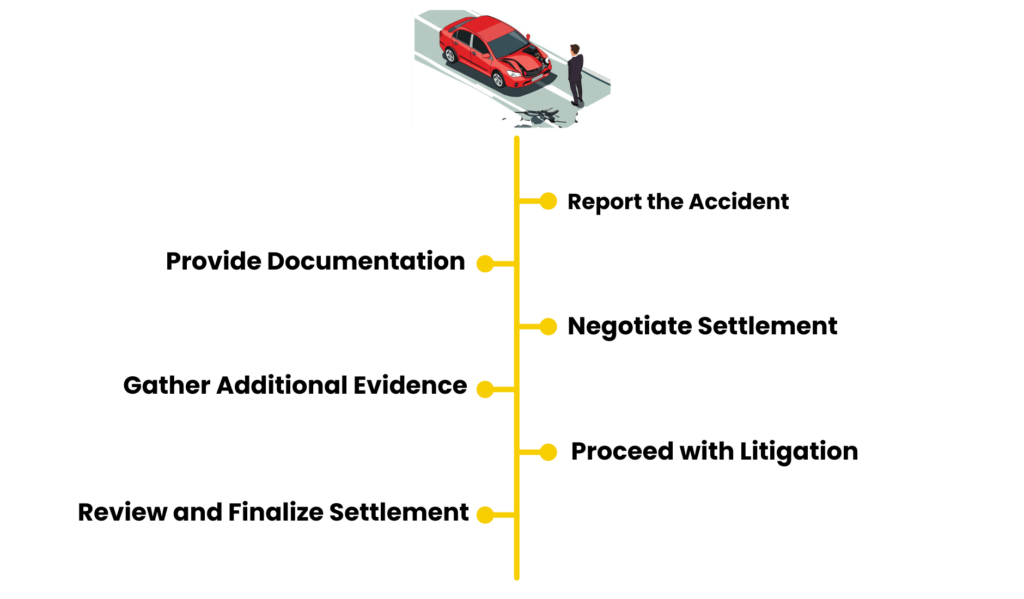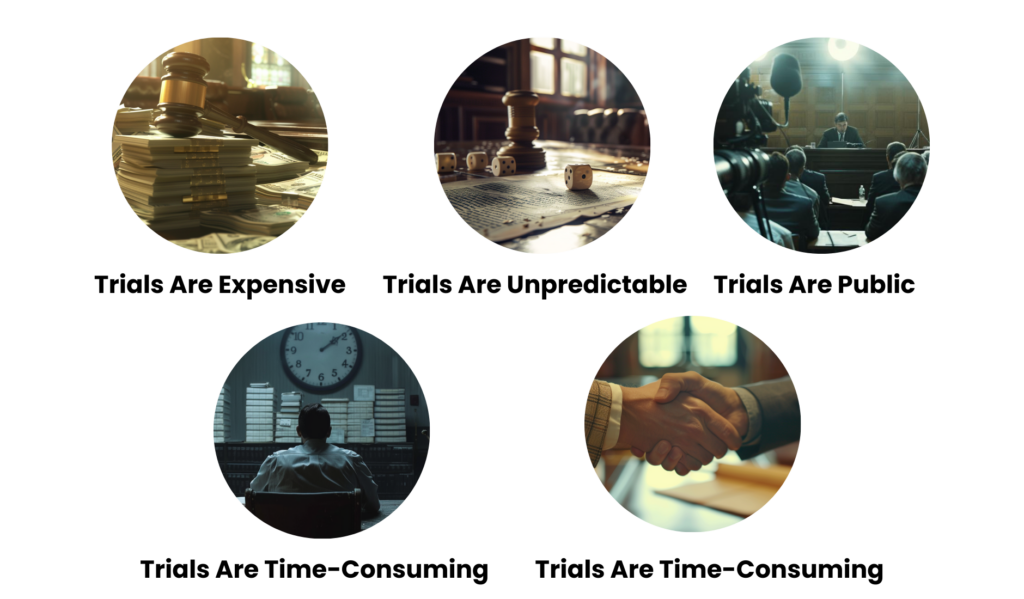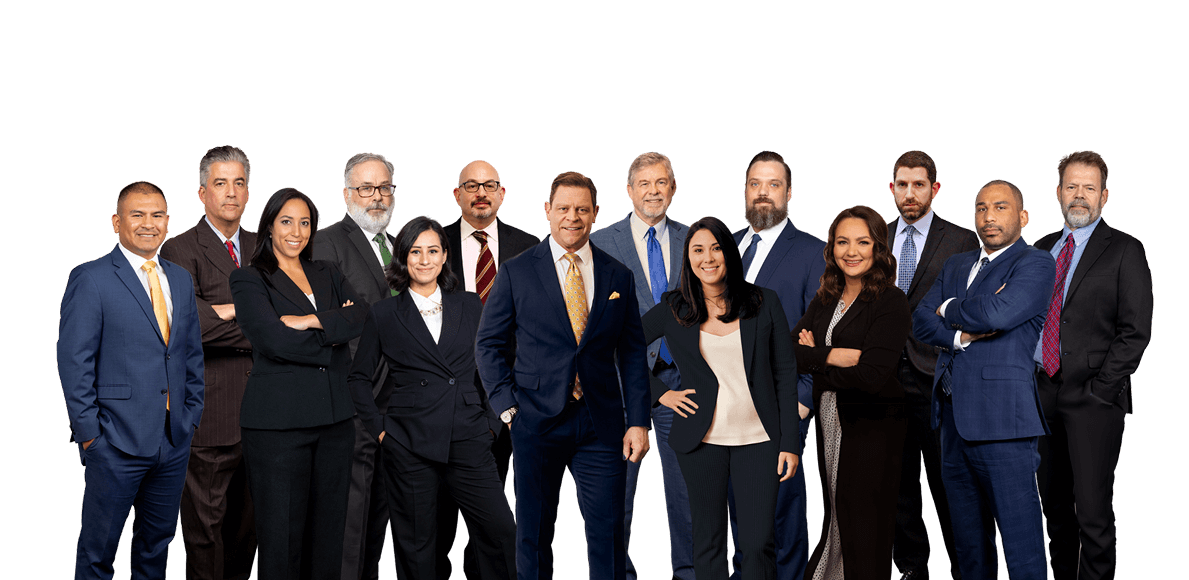
Lawyers settle the vast majority of car accident cases before they ever reach the inside of a courtroom. Below is some information about the process of resolving car accident claims and what factors influence whether a case will likely go to trial.
If you’ve been in a car accident, one of the first questions on your mind might be whether your case will end up going to court. The thought of having to testify before a judge and jury can be intimidating.
What is the Car Accident Claim Process?
After a car crash, the first step is to report the accident to the insurance companies – yours and the other drivers (if they were at fault). You’ll need to cooperate with the insurers as they investigate the accident. This usually involves giving a recorded statement about what happened and providing documentation like police reports, medical records, and proof of your damages, which are essential components of your personal injury claim.

The next phase is negotiation once the insurance companies have finished their investigations. Your car accident lawyer will attempt to negotiate a fair settlement offer from the insurer to compensate you for your medical bills, lost income, pain and suffering, vehicle damage, and any other losses from the car accident.
Throughout this process, your car accident attorney may need to gather additional evidence to build your case, which can include interviewing witnesses, consulting with expert witnesses, obtaining traffic camera footage, and more. Building a strong case is important for convincing the insurer to offer a reasonable settlement.
Settlement negotiations successfully resolve the large majority of car accident settlements without the need for a lawsuit or trial. However, if the insurance company denies your claim outright or fails to make a fair settlement offer, your lawyer may advise you that the best course of action is to file a lawsuit. This begins the litigation process that can eventually lead to a trial if a settlement still can’t be reached.
Why Do Most Cases Settle Out of Court?

Trials Are Expensive
Taking a car accident case to trial involves significantly higher legal expenses. Both sides must pay for their lawyers to spend time preparing for the trial and then arguing the case in court. They may also need to pay for expert witnesses to testify, which can cost money.
These extra costs can add up quickly, often reaching tens of thousands or even more. Insurance companies know this and will instead avoid spending that much money if they can. Settling a case before trial is usually much cheaper for them in the long run. This is one of the main reasons insurers try to settle instead of letting a case go to court.
Trials Are Unpredictable
Another reason insurers prefer to settle car accident cases is that trials can be unpredictable. When a case goes to court, it will be decided by a jury of regular people. These jurors might feel sympathy for the person who was hurt in the accident, especially if their injuries were severe.
There is always a risk that the jury will side with the injured person and award them even more money than they requested in a settlement. Insurers don’t like this uncertainty. They will control the situation by negotiating a set settlement amount they can budget. Settling also allows them to avoid the possibility of a runaway jury verdict that can cost them a lot more than they were expecting to pay.
Trials Are Public
When a car accident case goes to trial, it becomes a matter of public record. This means anyone can go to the courthouse and watch the trial or read about it in the news. For insurance companies, this is not ideal.
Insurers don’t want the general public to hear all the case details, especially if those details might make them look bad. For example, if it comes out in court that the insurer acted unfairly or tried to lowball the injured person with a settlement offer, it can hurt their reputation. High-profile cases that get a lot of media attention are especially risky for insurers. They will keep things quiet by settling out of court whenever possible.
Trials Are Time-Consuming
The legal process moves slowly, and trials can take a long time. It often takes months or even years to file a car accident lawsuit until the case finally reaches trial. During all that time, the insurance company will have to keep paying their lawyers to work on the case.
Insurers prefer to wrap things up much faster than that. Settlement of a case out of court can often be done in a matter of weeks or a few months at most. The quicker they can resolve a claim, the better for their bottom line. Knowing that car accident lawsuits can take a long time is another reason why insurance companies often push for a settlement instead.
Plaintiffs Prefer Settlements Too
It’s not just insurance companies that usually prefer settlements over trials in car accident cases. Most of the time, the injured person (the plaintiff) will settle. There are a few key reasons for this.
First, going to trial is stressful. The plaintiff must testify in court and undergo cross-examination by the opposing lawyer. This can be an intimidating experience. Second, there is no guarantee that the plaintiff will win at trial or get as much money as they want. It’s a gamble.
With a settlement, the plaintiff knows exactly how much money they will receive. As long as the settlement offer is fair and covers their losses, most people will take that guaranteed payout rather than gamble with a trial. Getting their money faster through a settlement is also appealing for many plaintiffs who are struggling with mounting medical bills and time missed from work after an accident.
For all these reasons, the odds of your case going to court are very low. However, the small handful of cases that make it to trial tend to have some factors in common. Let’s look at the characteristics that make a car accident case more likely to be decided by a judge and jury.
When is a car accident trial most likely to happen?
If you’ve sustained injuries in a car crash, it’s important to understand that while trials are uncommon in car accident cases, some scenarios can increase the odds of a case heading to court. Complex disputes over liability, significant discrepancies in settlement amounts, or substantial evidence conflicts may necessitate a trial for resolution. Tis is why having an car accident lawyer is crucial to effectively present your case and advocate for your best interests in court.
Liability Is Disputed
In some car accident cases, it’s unclear who was at fault for causing the crash. Witnesses might give conflicting stories or lack solid evidence to prove what happened. When liability is disputed like this, reaching a settlement for a car accident injury claim can be much harder.
The insurance company may argue that their customer wasn’t fully to blame for the accident. If they believe their policyholder was only partially at fault or not at fault at all, they probably won’t offer to pay the full amount of compensation the injured victim is seeking. A car accident attorney can challenge any wrongful accusations of partial blame by the insurance company, but they might be unsuccessful.
If the two sides cannot agree on liability and settlement amount, the case may need to proceed to trial for resolution. At trial, it will be up to a judge or jury to examine all the evidence and decide on fault and financial responsibility for the accident.
Severe Injuries Occurred
The more serious the injuries from a car accident, the more likely the case is to end up in court. When someone suffers catastrophic harm like brain damage, paralysis, or loss of a limb, the costs of their medical care and the impact on their life are tremendous. If a person dies in a crash, their family suffers immense losses.
In cases involving severe injuries or death, working with a knowledgeable personal injury attorney is crucial. The financial impact on the victim or their family can easily reach hundreds of thousands or even millions of dollars. Because of these high stakes, insurance companies are often reluctant to agree to such large payouts in a settlement. They may dispute the severity of the injuries or argue that the compensation requested by the victim is excessive.
Insurers know that if the case goes to trial, a jury may sympathize with a badly injured plaintiff and award them a substantial sum. However, in some situations, they still decide to take their chances in court rather than agree to a massive settlement. This can be especially true if the insurance company thinks they have a strong argument against liability.
Multiple Parties Are Involved
Some car accidents are more complicated than others. Things can get tricky quickly if the crash involves multiple vehicles, drivers, and car accident lawyers. With several competing insurance companies in the mix, each may point the finger at the others to avoid taking responsibility.
Determining who is at fault and to what degree becomes a much more complex task in these multi-party accidents. Insurance companies may dig in their heels and be less willing to settle if they believe their policyholder’s liability is minimal compared to the other parties.
Untangling the web of liability and deciding how much each party should pay can be an intensive process. It may require a lot of investigation and back-and-forth between the various insurers and legal teams. If they can’t reach an agreement, a trial might be the only way to conclusively decide each party’s share of fault and financial obligations.
The Insurer Acted in Bad Faith
Insurance companies have a legal duty to handle claims fairly and in good faith. This means they must promptly investigate claims, communicate honestly with policyholders and claimants, and refrain from deceptive or unfair settlement practices.
But sometimes, insurers fall short of these standards. They might delay investigating a claim, refuse to pay out valid benefits or use other tactics to avoid their responsibilities. If an insurance company is found to have acted in bad faith, it can face serious legal consequences.
In some cases, a car accident victim may file a separate lawsuit against the insurer for acting in bad faith during the claims process. These bad faith suits aim to hold the insurer accountable and recover additional damages beyond what the victim owes for the accident.
While bad faith claims are not the norm, they do happen. And when they do, the odds of the case going to trial are high. The victim must prove in court that the insurer breached their duties and should face financial penalties.
A Reasonable Settlement Can’t Be Reached
Despite everyone’s best efforts, sometimes a car accident case just can’t be settled out of court. There are situations where the victim and the insurance company are too far apart in their ideas of what a fair settlement should be.
The victim may feel that the insurer’s settlement offers are too low and don’t adequately account for all their losses. If the insurer refuses to budge and continues to make lowball offers, the victim may decide their only choice is to file a personal injury lawsuit.
Going to court is a way for the victim to have their case heard by an impartial judge or jury. It’s a gamble, but if the victim’s case is strong, they may be awarded significantly more in damages at trial than what the insurer was willing to pay in settlement talks.
A good car accident lawyer can help a victim weigh the risks and benefits of rejecting a settlement offer and going to court for a car accident settlement. If a reasonable agreement can’t be reached, having a skilled legal professional in their corner can give a victim the best possible chance of success in the courtroom.



